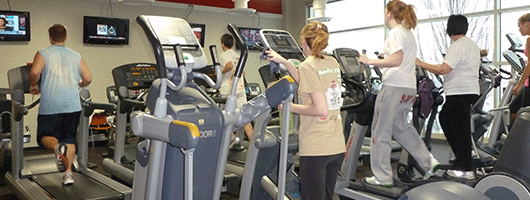 Health, Physical Education, and Recreation | HPER
Health, Physical Education, and Recreation | HPER
P Prerequisite | C Co-requisite | R Recommended
I Fall Semester | II Spring Semester | S Summer Session/s
- HPER-E 100 Experience in Physical Education (1-3 cr.) Instruction in a specified physical education activity that is not regularly offered by the Department of Kinesiology. Emphasis on development of skill and knowledge pertinent to the activity. I, II May be repeated for credit.
- HPER-E 111 Basketball (1 cr.) Instruction in fundamental skills of shooting, passing, ball handling, footwork, basic strategies of offensive and defensive play, and interpretation of rules.
- HPER-E 133 Fitness and Jogging I (1 cr.) Beginning instruction in the basic principles of fitness as they apply to a jogging program. Emphasis on cardiorespiratory endurance and flexibility. Basic concepts underlying Dr. Kenneth Cooper's aerobic program. For students without prior experience in jogging programs, aerobics levels I through III.
- HPER-E 159 Racquetball (1 cr.) Instruction in basic skills for beginning players. Includes both four-wall singles and doubles games. May be repeated for up to 2 credits.
- HPER-E 187 Weight Training (1 cr.) Instruction in basic principles and techniques of conditioning through use of free weights. Emphasis on personalized conditioning programs. May be repeated for up to 2 credits.
- HPER-E 190 Yoga I (1 cr.) Hatha Yoga postures for flexibility, toning, suppleness, stamina. Deep-complete breathing for vitality and in-depth relaxation. Introduction to basic yogic philosophy. May be repeated for up to 2 credits.
- HPER-E 233 Fitness and Jogging II (1 cr.) P: Aerobics Level III. A continuation of Fitness and Jogging I. Course designed to take student from aerobics Level III up to Level V.
- HPER-E 333 Fitness and Jogging III (1 cr.) A continuation of Fitness and Jogging II. Course designed for those students interested in preparing for Marathon Running.
- HPER-H 160 First Aid and Emergency Care (2-3 cr.) Course addresses cardiopulmonary resuscitation (CPR), rescue breathing, choking, wounds, bleeding, burns, sudden illnesses, musculoskeletal injuries, and defibrillation/ the use of Automated External Defibrillators (AEDs). Skills are practiced in small lab settings. Students may obtain American Red Cross certifications, including CPR/AED for the Professional Rescuer. May be repeated for up to 6 credits.
- HPER-H 617 Seminar in Health Education (1-3 cr.) Contemporary topics in the area of health education are studied under the direction of faculty members with specialized areas of expertise. Specific topics vary. May be repeated for credit.
- HPER-N 220 Nutrition for Health (3 cr.) Introduction to nutrients, their uses, and food sources. Application of nutrition principles to personal eating habits for general health; overview of current issues in nutrition.
- HPER-P 140 Foundations and Principles of Physical Education (2 cr.) C: Must be taken concurrently with HPER-P 141 Fundamental Skills in Physical Education. An introduction to historical, sociological, philosophical and psychological principles related to physical education.
- HPER-P 216 Current Concepts and Applications in Physical Fitness (3 cr.) Part of new fitness core in teacher preparation curriculum; introductory course in fitness prerequisite to upper level course work required by Indiana State Department of Education and NASPE for teacher certification in physical education.